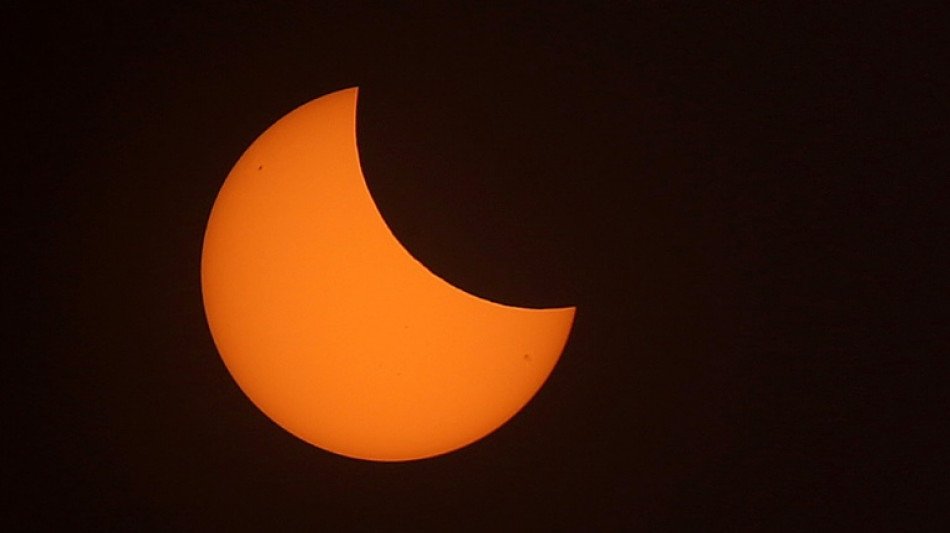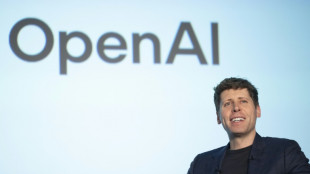
-
 A rough guide to F1 rule changes for 2026
A rough guide to F1 rule changes for 2026
-
At least 25 killed at Pakistan's pro-Iran weekend protests

-
 Israel kills 31 in Lebanon, vows to expand strikes after Hezbollah fire
Israel kills 31 in Lebanon, vows to expand strikes after Hezbollah fire
-
Myanmar grants amnesty to over 7,000 convicted of 'terrorist group' support

-
 Riyadh's King Fahd stadium to host 2027 Asian Cup final
Riyadh's King Fahd stadium to host 2027 Asian Cup final
-
'Superman Sanju' toast of India after T20 World Cup heroics

-
 Travel chaos, but F1 season-opener in Australia 'ready to go'
Travel chaos, but F1 season-opener in Australia 'ready to go'
-
Lunar New Year heartache for Chinese team at Women's Asian Cup

-
 El Nino may return in 2026 and make planet even hotter
El Nino may return in 2026 and make planet even hotter
-
Somaliland's Israel deal could put Berbera port at risk

-
 Texas primaries launch midterm battle with Trump agenda at stake
Texas primaries launch midterm battle with Trump agenda at stake
-
How a Syrian refugee chef met Britain's King Charles

-
 Bangladesh tackle gender barriers to reach Women's Asian Cup
Bangladesh tackle gender barriers to reach Women's Asian Cup
-
Argentina's Milei says wants US 'strategic alliance' to be state policy

-
 'Sinners' wins top prize at Screen Actors Guild awards
'Sinners' wins top prize at Screen Actors Guild awards
-
New rules, same old suspects as F1 revs up for 2026 season

-
 World Cup tickets: Huge demand and sky-high prices
World Cup tickets: Huge demand and sky-high prices
-
List of key Actor Award winners

-
 Trump hunkers down after Iran strikes
Trump hunkers down after Iran strikes
-
China's leaders gather for key strategy session as challenges grow

-
 UK toughens asylum rules to discourage migration
UK toughens asylum rules to discourage migration
-
Israel hits Lebanon after Hezbollah fire, expanding Iran war

-
 CBS in turmoil as US media feels pressure under Trump
CBS in turmoil as US media feels pressure under Trump
-
Messi bags double as Miami battle back to down Orlando

-
 Greenland is 'open for business' -- kind of, says business leader
Greenland is 'open for business' -- kind of, says business leader
-
Canada's Carney to mend rift, boost trade as he meets India's Modi

-
 Crude soars, stocks drop after US strikes on Iran
Crude soars, stocks drop after US strikes on Iran
-
Iran war spreads across region as US, Israel suffer losses

-
 Miriam Margolyes tackles aging in Oscar-nominated short
Miriam Margolyes tackles aging in Oscar-nominated short
-
Recognition, not competition, for Oscar-nominated foreign filmmakers

-
 Israel, Hezbollah trade fire: latest developments in Iran war
Israel, Hezbollah trade fire: latest developments in Iran war
-
Israel strikes Tehran: latest developments in Iran war

-
 Trump vows to avenge first US deaths as Iran war intensifies
Trump vows to avenge first US deaths as Iran war intensifies
-
MWC 2026: Amdocs Unveils CES26, an Agent-driven BSS-OSS-Network Suite, powered by the Amdocs aOS Cognitive Core

-
 MWC 2026: Amdocs Launches Global eSIM Traveler Solution, Enabling Telcos to Reclaim the Roaming Journey
MWC 2026: Amdocs Launches Global eSIM Traveler Solution, Enabling Telcos to Reclaim the Roaming Journey
-
Empire Joins Western Australia Delegation

-
 InterContinental Hotels Group PLC Announces Transaction in Own Shares - March 02
InterContinental Hotels Group PLC Announces Transaction in Own Shares - March 02
-
Genflow Biosciences PLC Announces Receipt of First Tranche of Grant

-
 Lowry collapses late again, Echavarria snatches victory in Cognizant Classic
Lowry collapses late again, Echavarria snatches victory in Cognizant Classic
-
Aubameyang strikes twice as Marseille edge Lyon in Ligue 1

-
 Infantino says players who cover mouths when speaking could be sent off
Infantino says players who cover mouths when speaking could be sent off
-
Bolsonaro son rallies the right as thousands protest Brazil government

-
 Juve stay in Champions League hunt with last-gasp Roma draw
Juve stay in Champions League hunt with last-gasp Roma draw
-
Maersk suspends vessel transit through Strait of Hormuz

-
 France, Germany, UK ready to take 'defensive action' against Iran
France, Germany, UK ready to take 'defensive action' against Iran
-
Knicks halt Spurs' 11-game NBA winning streak

-
 EU warns against long war, urges 'credible transition' in Iran
EU warns against long war, urges 'credible transition' in Iran
-
Bored of peace? Trump keeps choosing war

-
 Arteta embraces Arsenal's 'Set-Piece FC' label after corners sink Chelsea
Arteta embraces Arsenal's 'Set-Piece FC' label after corners sink Chelsea
-
Sevilla rescue derby draw to deal Betis top four setback


Partial solar eclipse to cross swathe of Northern Hemisphere
Skygazers across a broad swathe of the Northern Hemisphere will have a chance to see the Moon take a bite out of the Sun on Saturday when a partial solar eclipse sweeps from eastern Canada to Siberia.
The partial eclipse, which is the first of the year and the 17th this century, will last around four hours from 0850 GMT to 1243 GMT.
Curious observers making sure to protect their eyes might be able to see the celestial show in most of Europe, as well as in some areas of northeastern North America and northwest Africa.
Eclipses occur when the Sun, Moon and Earth all line up. When they perfectly align for a total solar eclipse, the Moon fully blots out the Sun's disc, creating an eerie twilight here on Earth.
But that will not happen during Saturday's partial eclipse, which will instead turn the Sun into a crescent.
"The alignment is not perfect enough for the cone of shadow to touch the Earth's surface," Paris Observatory astronomer Florent Deleflie told AFP.
Because that shadow will "remain in space, there will not be a total eclipse anywhere" on Earth, he said.
At most, the Moon will cover around 90 percent of the Sun's disc. The best view will be from northeastern Canada and Greenland at the peak time of 1047 GMT.
- Beware eye damage -
It will be less spectacular in other areas. In France, for example, between 10 to 30 percent of the Sun's disc will be obscured, depending on the region.
Ireland will see around 40 percent, according to Sophie Murray of the Dublin Institute of Advanced Studies. However rain is forecast.
These smaller percentages of eclipse will not be visible to the naked eye.
However, if the sky is clear, skygazers will be able to watch the eclipse through special viewers -- as long as they take precautions.
Looking straight at the Sun -- during an eclipse or otherwise -- can lead to irreversible vision loss.
Skygazers are advised to buy eclipse-viewing glasses and ensure they are in good condition.
Even a slight defect or "microscopic hole" can cause eye damage, Deleflie warned.
Or, people could watch the eclipse at a local astronomy observation centre where "you can safely verify the precision of celestial mechanics and marvel at interesting details on the Sun's surface, such as sunspots", Deleflie said.
Murray offered another option.
"You can make a simple pinhole projector by poking a small hole in a piece of paper or cardboard and letting sunlight pass through it onto the ground or another surface, where you'll see a small, inverted image of the eclipsed Sun," she said.
The partial eclipse will not turn up on a smartphone camera without a suitable filter, Deleflie added.
The latest celestial show comes two weeks after skygazers across much of the world marvelled at a rare total lunar eclipse, dubbed a "Blood Moon".
These events often happen after each other because the Moon has "completed a half-circle around the Earth in the meantime, reversing the configuration", Deleflie explained.
A greater spectacle is expected on August 12, 2026, when a total solar eclipse will be visible in Iceland, northern Spain and parts of Portugal.
More than 90 percent of the Sun will also be obscured in areas of Europe including Britain, France and Italy.
It will be the first total solar eclipse since one swept across North America in April 2024.
Y.Kobayashi--AMWN

